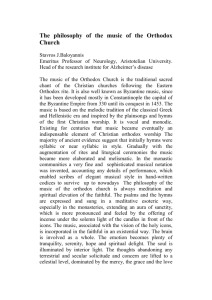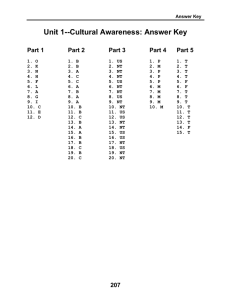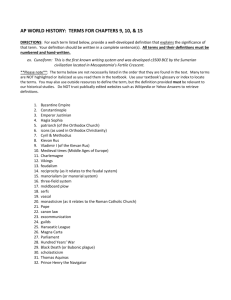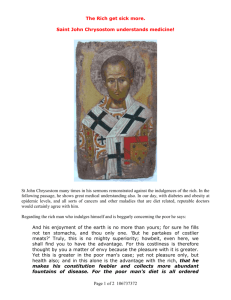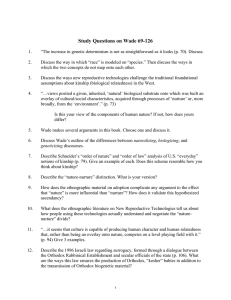Kristeva-- Crisis of the European Subject larger argument
advertisement
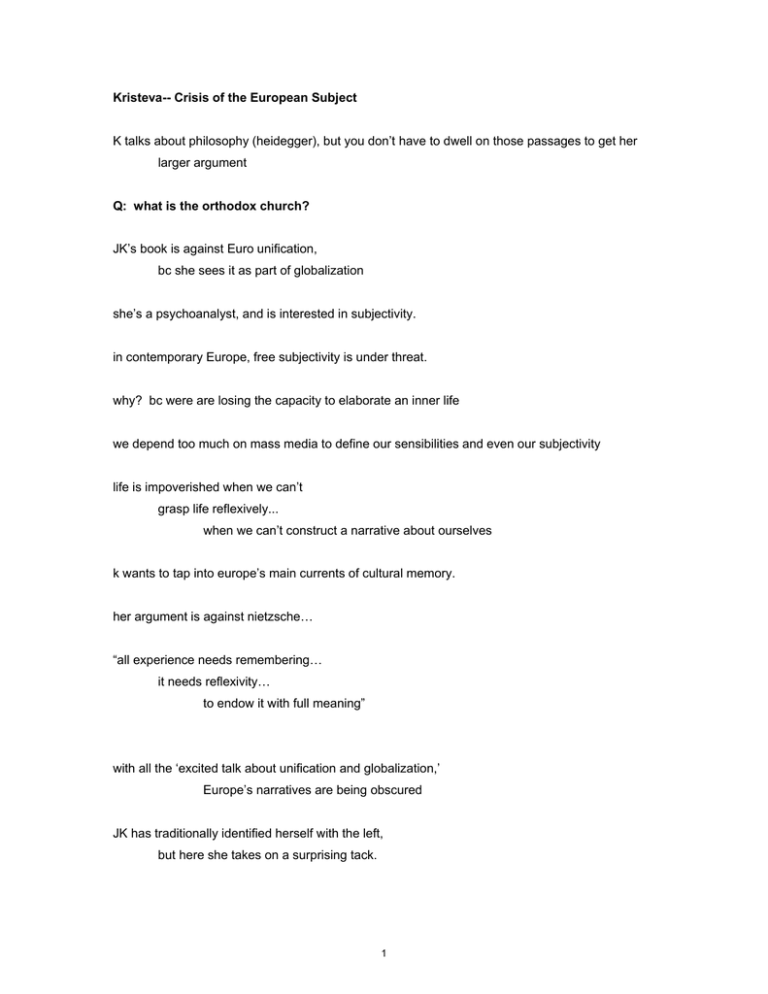
Kristeva-- Crisis of the European Subject K talks about philosophy (heidegger), but you don’t have to dwell on those passages to get her larger argument Q: what is the orthodox church? JK’s book is against Euro unification, bc she sees it as part of globalization she’s a psychoanalyst, and is interested in subjectivity. in contemporary Europe, free subjectivity is under threat. why? bc were are losing the capacity to elaborate an inner life we depend too much on mass media to define our sensibilities and even our subjectivity life is impoverished when we can’t grasp life reflexively... when we can’t construct a narrative about ourselves k wants to tap into europe’s main currents of cultural memory. her argument is against nietzsche… “all experience needs remembering… it needs reflexivity… to endow it with full meaning” with all the ‘excited talk about unification and globalization,’ Europe’s narratives are being obscured JK has traditionally identified herself with the left, but here she takes on a surprising tack. 1 She argues for the nation She argues against the EU She champions the “esprit général” that preserves national identity… She champions this over identity politics-such as the claims of women and minority constituencies “Europe Divided” she poses the critical problematic of a divided Europe what are the problems with unification? -- it could subsume the ancient and diverse cultures of Europe -- it could subsume the economies of Europe… within a greater and undifferentiated supranational identity this supranational identity could backfire… spurring violent ethnonationalism question: how do we see this in the case of the former yugoslavia? REmember that JK is psychoanalyst… she’s interested in the individual psyche. In fact, even when she’s talking about continental politics, the individual psyche is always at the crux When she speaks of freedom, she means individual dignity and expression 2 So, she’s a Bulgarian immigrant, but does she support Bulgarian integration? No. the east is underdeveloped in terms of infrastructure but more importantly, it has deficiencies in public morality. the east has just left totalitarianism, and doesn’t have its own democratic tradition All this said, she thinks that both sides of Europe have their strengths and weaknesses… Western Europe suffers the maladies of the soul -- figura, language, representation East is corrupt, but spiritual -- icon, sensory, semiotic Each side supplements the other JK wants to see the East, particularly bulgaria and the orthodox church… as a “bulwark against moral deracination” … and also as a model for returning the European subject to moral and psychic wholeness “Europe Divided” JK doesn’t just use terms east/west, christian/orthodox… question what are the other key terms of this essay? We/They; us/them She begins by plotting out the main problem with globalization, from a psychoanalytic perspective. 3 Q: what’s the problem with globalization? it privileges economic performance and technological innovation JK asks, is this always the best for humans? (115) in other words, she wants to know how europe can be more than ‘useful’ ...she wants it to be meaningful Kant: categorical imperative… can’t use another as instrument JK makes some of the same points about French Revolution that were made in Babel Tower. What are they? Q: what is freedom in the west? liberal democracy freedom to produce, freedom to the mastery of production -- she gives example of calvinist predestination freedom is the power to produce -- objects of desire and consumption Q: are the ppl of the East ‘free’? they have been liberated, but they’re not free she brings up some stereotypes of Eastern Europeans. What are they? -- the cynical communist -- the atheist mafioso 4 she doesn’t really take them apart, but accepts them… arguing that out of communism and nihilism, these figures are bound to linger in E Europe on the subject of nihilism, she doesn’t directly mention Nietzsche… but she does mention a russian writer… Dostoevsky… god is dead; crisis in morality JK finds roots of this nihilism, paradoxically, in orthodox mysticism itself. How? absorbed in unrepresentable faith is glorious but inaccessible… it looms over the universe and “at the same time evacuates God from human reality” 147/ read passage Ultimately, JK argues for different christian federations catholic protestant orthodox what gets left out? East and West: she wants to put them into dialogue she sees them as opposite but complementary poles of freedom 159/ at bottom: defines what differing freedoms of E and W are finally, to integrate orthodox nations is to subjugate them to western designs 5 MIT OpenCourseWare http://ocw.mit.edu 21G.017 Germany and its European Context Fall 2002 For information about citing these materials or our Terms of Use, visit: http://ocw.mit.edu/terms.

